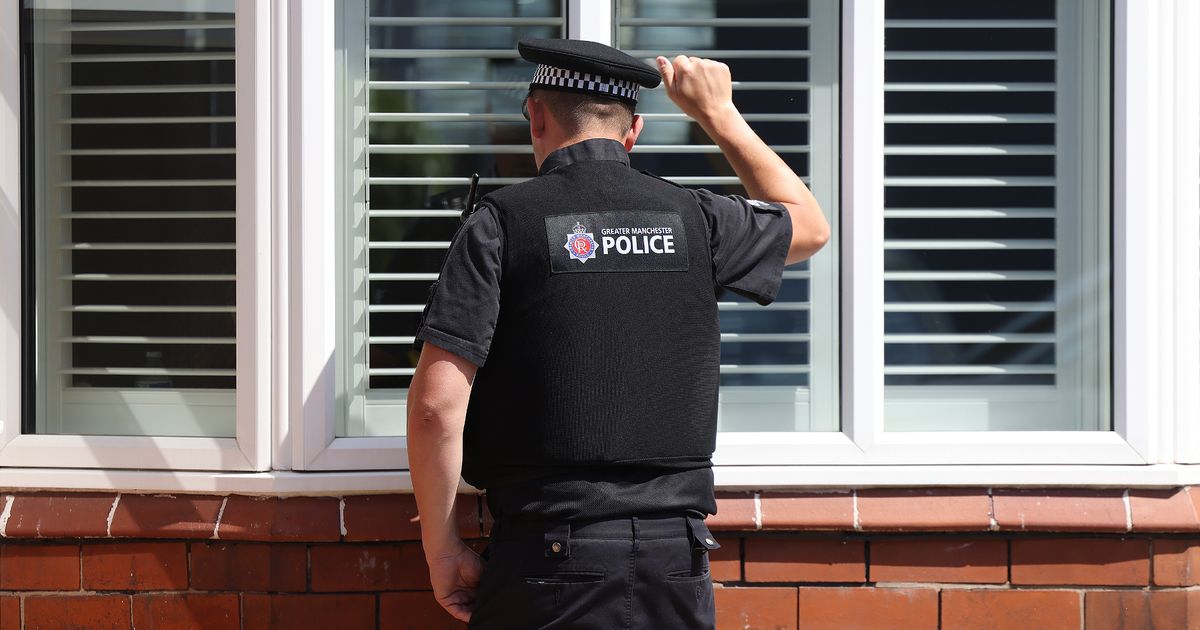Six months since Greater Manchester Police were given new powers to tackle domestic abuse, Joseph Timan joins officers for the day to see how it all works.
18:26, 01 Jun 2025Updated 18:26, 01 Jun 2025
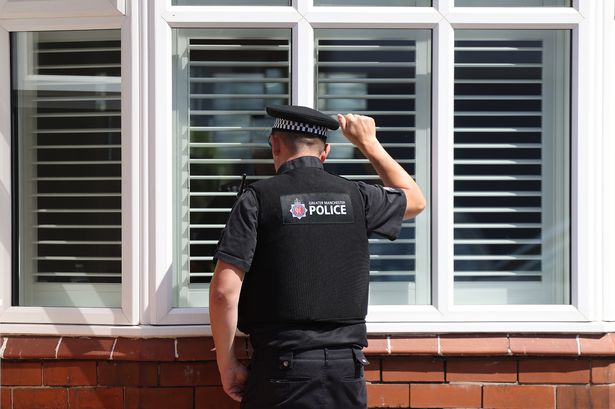 The DAPOs were introduced last year(Image: Manchester Evening News)
The DAPOs were introduced last year(Image: Manchester Evening News)
As the police car pulls up on a quiet cul-de-sac in Wigan, another vehicle drives off, raising suspicions.
PC Carl Beck proceeds towards the property. He knocks on. No answer. Then he hears something.
“Who opened the back door?” he asks the woman who eventually appears. “Me,” she responds.
The officers aren’t convinced. They ask if they can have a quick look inside, but she refuses.
“I’m absolutely fine,” she tells them, explaining that she’s running late for work. “You’re embarrassing me.”
“There’s nothing we can do,” PC Chris Wilcock tells the Manchester Evening News when she walks back in.
The woman is not a criminal. She has done nothing wrong. She is a victim of domestic abuse and the police want to protect her.
Back in February, the woman’s partner was locked up after police received reports that she had been ‘kicked in the ribs’.
A few days later, a court issued a Domestic Abuse Protection Order (DAPO) which prohibits him from contacting her.
This new type of order, which is being trialled in Greater Manchester, was issued at the police’s request. The woman did not want it.
“We’ve got to take it out their hands sometimes,” PC Beck says, “so they don’t get killed.”
In October 2023, just one mile away on the Scholes estate, a 44-year-old woman was brutally murdered by her abusive ex-partner.
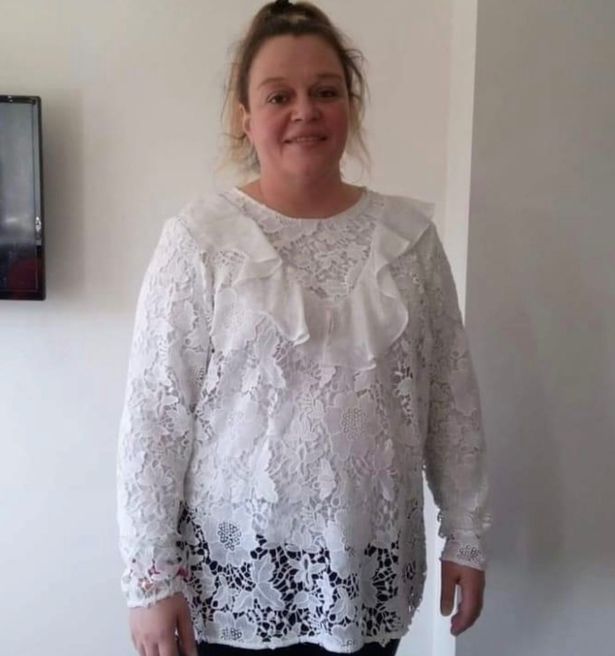 Caroline Gore, 44, was murdered in October 2023(Image: GMP/Family)
Caroline Gore, 44, was murdered in October 2023(Image: GMP/Family)
Caroline Gore was supposed to protected by a restraining order. But David Liptrot ignored it – and was allowed to get away with it.
Less than four weeks before stabbing her to death at her flat in Douglas House, Liptrot was spared jail for breaching the order again.
Last year, the Manchester Evening News launched a campaign in memory of Caroline, calling for a mandatory minimum prison sentence for anyone who breaches protective orders and for better monitoring of perpetrators, including through electronic tags.
More than 75,000 people have signed our petition which has been supported by domestic abuse charities and raised in Parliament.
DAPOs are part of the solution. Since they were launched in Greater Manchester six months ago, 209 DAPOs have been issued.
So far, five people have been sent to prison for breaching the orders and many more have received other forms of punishment.
Greater Manchester Police, which is one of three forces across the country taking part in the two-year pilot, has been criticised for failing victims of domestic abuse in recent years – something it has publicly apologised for, promising that it’s turning things around.
Starting in Bury last year, DAPOs have now been rolled out in Wigan – where domestic abuse is most prevalent – and in Manchester.
Anyone in these boroughs can apply for a DAPO, including the victims themselves or third parties, such as charities, supporting them.
Crucially though, the police can apply to the courts to issue the order – which can last a lifetime – even if the victim doesn’t want it.
And unlike restraining orders, police regularly monitor whether DAPOs are being adhered to with regular checks conducted by officers.
Last month, GMP invited the M.E.N. to join officers who spent the day checking in on all victims and suspects in the borough of Wigan.
 PC Beck is part of the response team in Wigan(Image: Manchester Evening News)
PC Beck is part of the response team in Wigan(Image: Manchester Evening News)
For PCs Beck and Wilcock from the district’s response team, it’s a bit of a change of pace. But they are no strangers to domestic abuse.
“A lot of time is spent dealing with domestics in the Wigan area,” PC Wilcock says, claiming most call-outs are ‘domestic-related’.
But today is different. The officers aren’t responded to calls from victims in crisis – they are making sure abusers are staying away.
In a team briefing before they set off from Wigan Police Station, they are told to be ‘politely intrusive’ when making their enquiries.
“We want to be confident the victim isn’t hiding anything, for example, hiding the suspect,” DI Chris Preston tells the team.
The officers are then split into teams of two, with each pair tasked with seven checks – seven victims and seven suspects.
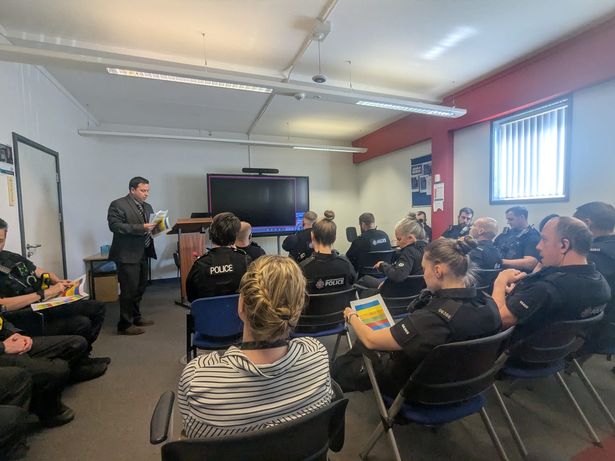 DI Chris Preston delivered the briefing at Wigan Police Station(Image: Manchester Evening News)
DI Chris Preston delivered the briefing at Wigan Police Station(Image: Manchester Evening News)
Before they head out, Inspector Paul O’Donnell offers some words of encouragement, telling the team he wants some arrests today.
“I think it would be surprising if there was no one breaching conditions,” PC Wilcock tells the M.E.N. as we head out to the first address.
PC Beck has a plan. Visit the victim first and if the suspect is there, they’ll be arrested on the spot. But things get tricky if no one’s in.
At the first address in Standish, there’s no answer at the door. A nosy neighbour appears instead. “Is everything alright?” she asks.
The officers ask her if she’s seen a man in her neighbour’s property recently. “He’s not been here since he’s been locked up,” she says.
Satisfied with their enquiries, the officers move onto the next stop. After several knocks on the door, a woman eventually appears.
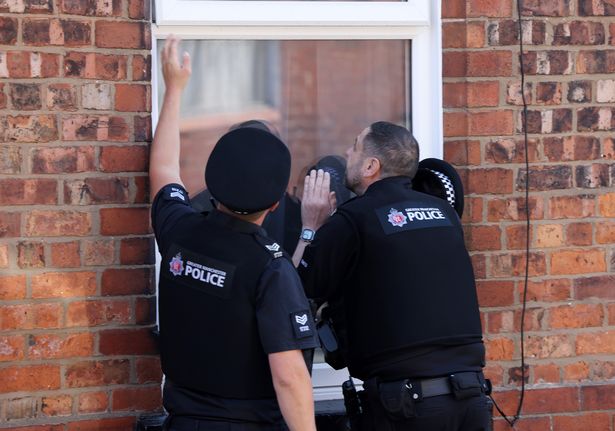 PCs Beck and Wilcock were tasked with checking on seven victims and seven suspects(Image: Manchester Evening News)
PCs Beck and Wilcock were tasked with checking on seven victims and seven suspects(Image: Manchester Evening News)
“I’ll just get dressed,” she shouts from the bedroom window upstairs. “I’m shaking,” she tells the officers as she opens the front door.
After assuring the officers that her abuser has not been in contact for ‘a while’, she agrees to speak to the M.E.N. about her experience.
“I felt safer with it,” she says, when asked about the DAPO. “I don’t think he would have stayed away if he hadn’t had that in place.
“I wanted it.”
Content that the victim is safe, the officers are happy to move on. They explain that the victim was talking about upgrading her CCTV.
“It shows she’s following up,” PC Wilcock said, satisfied that the victim is taking the court order, which she supported, seriously.
 PC Wilcock says ‘it’s common’ that victims don’t support the police taking action against their abusers(Image: Manchester Evening News)
PC Wilcock says ‘it’s common’ that victims don’t support the police taking action against their abusers(Image: Manchester Evening News)
But not everyone is supportive of the scheme. The final check that M.E.N. witnessed was on a victim who did not support the order.
Her partner was locked up in February after police received reports that she’d been ‘kicked in the ribs’. Days later, a DAPO was issued.
“It’s common that they don’t support,” PC Wilcock says.
“They could be traumatised by going through it again and again, going to court. Court can be a harrowing place to give evidence.
“It’s hard for police officers, so for a victim of crime, it can be traumatic just thinking about it.
“To get your loved ones prosecuted, it’s not an easy decision to make.”
“Even if the victim doesn’t support it,” he adds, “we need to be seen to be taking positive actions to safeguard the victim.”
The officers pull up outside the victim’s house. As they get out the car, another vehicle drives off in the opposite direction.
Questioning where the car came from, PC Beck writes down the number plate so that he can check if it belongs to the suspect.
As the officers approach the property and knock on, they hear the back door. Eventually a woman appears at the front door.
“Has he been sticking to it?” PC Wilcock asks her after the initial introductions. “Yes,” the victim replies.
The woman insists that she opened the back door. But when the officers ask her if they can have a quick look inside, she refuses.
 GMP is one of three forces taking part in the trial(Image: Manchester Evening News)
GMP is one of three forces taking part in the trial(Image: Manchester Evening News)
The officers argue with the woman for a few minutes, but she insists the suspect is not there and tells them she’s late for work.
“I’m fine,” she says, shutting the door. “You can follow me to work,” she adds as she walks down the street a few minutes later.
She tells PC Beck she’ll be back home at 6pm and he agrees to call again later. Meanwhile, PC Wilcock is speaking to the neighbours.
“He’s been here,” the officer reports back. “He’s here all the time,” he says after speaking to another neighbour. He was here last night.”
The officers discuss the possibility that the suspect left through the back door – or maybe he’s inside. But there’s nothing they can do.
When the officers return that evening, the victim does not provide any further details. GMP says all ‘safeguarding’ was completing.
In the end, only one arrest was made by the wider team on the day. GMP says that this means most people are sticking to them.
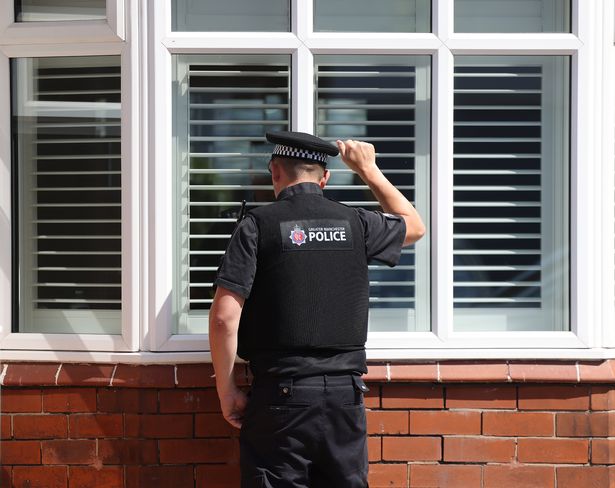 ‘He’s been here'(Image: Manchester Evening News)
‘He’s been here'(Image: Manchester Evening News)
“It’s frustrating but we don’t want to turn victims against us,” PC Wilcock says. “We’re victim-led as an organisation. It’s a fine line.”
“We’ve got to take it out their hands sometimes… so they don’t get killed,” PC Beck says as the officers drive off, feeling defeated.
Speaking to the M.E.N. earlier in the day, assistant chief constable Steph Parker expresses a similar view when asked about the DAPOs.
“I think the thing with this that really strikes a chord with me is that this takes it out of the victim’s hands,” she says.
“So some of the victims previously around the [Domestic Violence Protection Notices], they were needing to come to court, they were needing to come and say exactly why this was needed.
“This takes it away from them so it allows us to take that control and what is coming out from victims is that they’re just relieved that they are not having to go to court to face the perpetrators.”
This was the experience of one victim who told M.E.N. earlier this year that the DAPO was ‘the best thing that’s ever happened to me’.
 Assistant Chief Constable Steph Parker leads the portfolio for Protecting Vulnerable People(Image: GMP)
Assistant Chief Constable Steph Parker leads the portfolio for Protecting Vulnerable People(Image: GMP)
The woman, who suffers from anxiety and did not want to go to court, was pleased to see her ex-partner jailed for breaching a DAPO.
“I think it’s a massive deterrent to these perpetrators to be sent to prison for what they would previously have just had a slap on the wrist or a very menial fine,” ACC Parker said. “It’s absolutely a deterrent.
“But time will tell if we keep receiving breaches, if we keep receiving domestic abuse reports and it’s the same perpetrators – then perhaps we have to look at it differently.
“But I think at the moment, it sends a message out to the community and mainly to victims, we’re listening to them, that actually we’ll take things out of their hands if they don’t want to engage as such and we’ll protect them.
“And it sends a message to the perpetrators that this isn’t going away.”
Domestic abuse help
If you’re experiencing domestic abuse, below you’ll find a list of organisations who can assist you:
Call the UK police non-emergency number, 101, if you need support or advice from the police and it’s not an emergency. If you have a hearing or speech impairment, use our textphone service on 18001 101.
Greater Manchester Domestic Abuse Helpline – Monday to Friday, 10am to 4pm, except bank holidays. For anyone experiencing domestic abuse. Includes a language service and advice for the LGBT community.
End the Fear – Includes information on local help all over Greater Manchester.
Wigan and Leigh Dias drop-in centre – Works with women and men who are experiencing or recovering from domestic violence and abusive relationships and helps them to regain control of the situation.
Other support available can be found via: www.gmp.police.uk.
The scheme is set to be rolled out across Greater Manchester. But first the force wants to make some ‘tweaks’, such as introducing ‘interim orders’ to protect victims while perpetrators who are willing to take part in behavioural change programmes are ‘triaged’.
One of the benefits of the DAPO is that positive requirements can be part of the order. This includes electronic tags for monitoring.
The problem is, perpetrators must consent to positive requirements. This is something the force is looking at, ACC Parker says.
The top cop who leads the Protecting Vulnerable People portfolio says she would also ‘love’ to have a dedicated court for DAPOs – something that will be introduced at Manchester Magistrates’ Court for DAPO application hearings, starting from Monday (June 2).
GMP says that it is also discussing the challenge of ‘resourcing’ with the Home Office among other issues they are ‘working through’.
“We’ve just got to make sure we’ve got resources in the right place and that we’ve got the legislation right so we’re ready for the full roll out,” ACC Parker says.
The Home Office has been contacted for comment.
